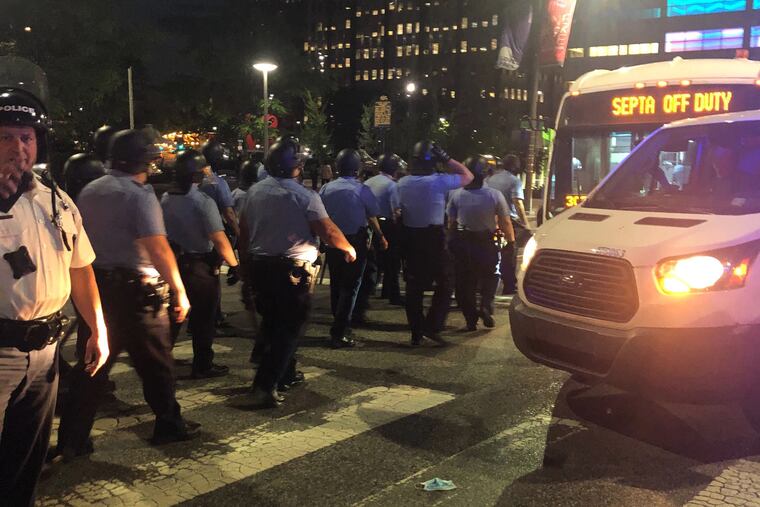SEPTA is transporting busloads of Philly police to help control the protests
Although questioned on social media, the relationship is “in many senses, a standard practice,” said SEPTA spokesperson Andrew Busch.

Nowadays, a packed SEPTA bus is an unusual sight.
Swarms of officers have been spotted filing in and out of SEPTA buses and en route to demonstrations, even as rider limits have been imposed amid the COVID-19 crisis and last-minute service disruptions were announced while protests unfolded across Philadelphia.
It’s “in many senses, a standard practice,” said SEPTA spokesperson Andrew Busch — a matter of calls among the city’s Office of Emergency Management, the Philadelphia Police Department, SEPTA transit police, and its operations staff.
“These few days have been different in so many ways,” Busch said, "but kind of the basic structure of how we put this together has been in place for a while.”
SEPTA has transported police since Saturday, with up to 14 buses available each day as demonstrations protesting George Floyd’s death continue. The transportation authority has provided similar police support in the past, as during Pope Francis’ visit to Philadelphia in 2015 and last year’s hours-long standoff in North Philadelphia that left six officers wounded, Busch said.
Why don’t Philadelphia police just use their own vehicles? It boils down to resources, said city spokesperson Kelly Cofrancisco. (Philadelphia police directed questions to the city.)
“We are using all means available to transport our officers to where they need to be to continue to respond to ongoing demonstrations,” she said in a statement. “This also alleviates the need to allocate parking resources along with traffic concerns.”
The practice drew some criticism on social media for “mobilizing police." One Twitter user remarked the authority “should be working with the people, not against them."
The decision concerns operations and safety, Busch said, and “definitely shouldn’t be taken as SEPTA having a position” on what’s happening.
The authority also has been criticized for the short notice it gave riders when announcing disruptions this week. SEPTA shut down service Sunday evening and abruptly halted operations in Center City on Monday.
“In Philly and in cities across the Delaware Valley, we are protesting against a system designed to uphold white supremacy and destroy Black lives,” the Philly Transit Riders Union said in a statement released Wednesday. “SEPTA should not respond by canceling buses for essential workers and then instead running them for police.”
In Minneapolis and New York City, bus operators have refused to assist in police transport.
SEPTA has enough buses in its fleet to serve riders and transport officers, Busch said. The choice to adjust service — leaving some stranded — was made for employee and passenger safety, he said, as some of the peaceful protests turned violent. Protection of SEPTA equipment was also taken into consideration, as multiple police cars were lit ablaze.
“We do understand some of the criticisms that some people may have, and certainly we understand the hurt that people are feeling right now ... ,” Busch said. “We do have a strong partnership with the City of Philadelphia, with the police department and our other partner agencies, and this is part of that partnership.”
SEPTA would not use buses to transport or hold arrested protesters, Busch said, and the city hasn’t made that request, Cofrancisco said. More than 700 people have been arrested since Saturday. The Philadelphia Sheriff’s Office and Philadelphia Department of Prisons vehicles have transported those arrested.
» READ MORE: Tear gas, then handcuffs: I am an Inquirer journalist who was arrested for doing my job
That’s also where Willie Brown, president of Transport Workers Union Local 234, draws the line. TWU Local 234 represents thousands of SEPTA employees, including bus operators.
“No. 1, I don’t think that’s our job to do it, the safety for my drivers and everything, we gotta be out there when this thing is over with," he said. "No. 2, my personal opinion, we gotta show some solidarity towards them, toward the cause.”
Brown said he was “in disbelief” when he saw the video capturing Floyd’s killing while in police custody.
In a joint statement released earlier this week, Transport Workers Union of America said: “This moment demands that we as a society hear the pleas of those peacefully flooding in the streets to seek redress for their grievances.”
“It’s a fine line on this," Brown said. "We support the police. We don’t have a problem with police. But we understand the actions of these young people.”